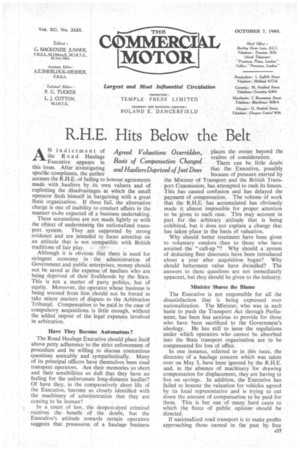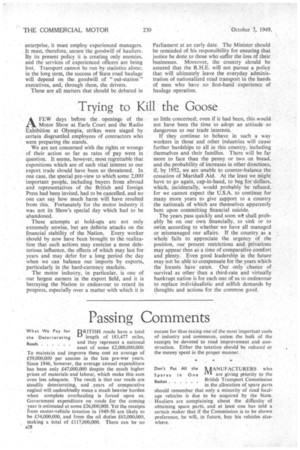R.H.E. Hits Below the Belt
Page 29

Page 30

If you've noticed an error in this article please click here to report it so we can fix it.
Agreed Valuations Overridden, Basis of Compensation Changed and HauliersDeprived of Ju.st Dues
AN indictment of the Ro a d Haulage Executive appears in this issue. After investigating specific complaints, the author accuses the R.H.E. of failing to honour agreements made with hauliers by its own valuers and of exploiting the disadvantages at which the small operator finds himself in bargaining with a great State organization. If these fail, the alternative charge is one of inability to conduct affairs in the manner to.,be expected of a business undertaking. These accusations are not made lightly or with the object of undermining the nationalized transport system. They are supported by strong evidence and are intended to focus attention on an attitude that is not compatible with British traditions of fair play.
Although it is obvious that there is need for stringent economy in the administration of Government and public enterprises, money should not be saved at the expense of hauliers who are being deprived of their livelihoods by the State. This is not a matter of party politics, but of equity. Moreover, the operator _whose business is being wrested from him should not be forced to take minor matters of dispute to the Arbitration Tribunal. Compensation to be paid in the case of compulsory acquisitions is little enough, without the added impost of the legal expenses involved in arbitration.
Have They Become Automatons?
The Road Haulage Executive should place itself above petty adherence to the strict enforcement of procedure and be willing to discuss contentious questions amicably and sympathetically. Many of its principal officers have themselves been road transport operators. Are their memories so short and their sensibilities so dull that they have no feeling for the unfortunate long-distance haulier? Of have they, in the comparatively short life of the Executive, become so closely identified with the machinery of administration that they are ceasing to be human?
In a court of law, the deepest-dyed criminal receives the benefit of the doubt, but the Executive's attitude towards certain operators suggests that possession of a haulage business places the owner beyond the realms of consideration, There can be little doubt that the Executive, possibly because of pressure exerted by the Minister of Transport and the British Transport Commission, has attempted to rush its fences. This has caused confusion and has delayed the payment of compensation. The volume of work that the R.H.E. has accumulated has obviously made it almost impossible for proper attention to be given to each case. This may account in part for the arbitrary attitude that is being exhibited, but it does not explain a change that has taken place in the basis of valuation. Why should better treatment have been given to voluntary vendors than to those who have awaited the " "? Why should a. system of deducting fleet discounts have been introduced about a year after acquisition began? Why should betterment value have dwindled? The answers to these questions are not immediately apparent, but they should be given to the industry.
Minister Shares the Blame The Executive is not responsible for all the dissatisfaction that is being expressed over nationalization. The Minister, who was in such haste to push the Transport Act through Parliament, has been less anxious to provide for those who have been sacrificed to the Government's ideology. He has still to issue the regulations under which operators who• cannot be absorbed into the State transport organization are to be compensated for loss of office. In one instance, referred to in this issue, the directors of a haulage concern which was taken over on May 3, have been ignored by the R.H.E. and, in the absence of machinery for drawing compensation for displacement, they are having to live on savings. In addition, the Executive has failed to honour the valuation for vehicles agreed by its local representative and is trying to cut down the amount of compensation to be paid for them. This is but one of many hard cases to which the force of public opinion should be directed.
If nationalized road transport is to make profits approaching those earned in the past by free enterprise, it must employ experienced managers. It must, therefore, secure the goodwill of hauliers. By its present policy it is creating only enemies, and the services of experienced officers are being lost. Transport cannot be run by statistics alone; in the long term, the success of State road haulage will depend on the goodwill of " out-station " executives, and, through them, the drivers.
These are all matters that should be debated in Parliament at an early date. The Minister should be reminded of his responsibility for ensuring that justice be done to those who suffer the loss of their businesses. Moreover, the country should be assured that the R.H.E. will not pursue a policy that will ultimately leave the everyday administration of nationalized road transport in the hands of men who have no first-hand experience of haulage operation.




































































































